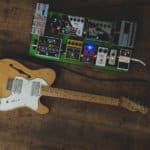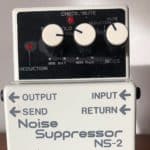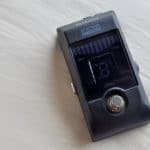Effect pedals are fantastic.
They alter the sound of the guitar to create memorable tunes.
Also, many of them simply are helpful tools to have a cleaner tone.
Under this category, we could name the noise gate pedal, for instance.
They just get rid of unnecessary hum, which is awesome!
However, it is worth asking whether that pedal will ultimately affect the tone.
After all, could it be possible that the sound you produce with a guitar changes due to the noise gate pedals?
Noise gates affect tone, but the effect is minimal. In the end, it depends a lot on the setting of the effect and the amp. Also, sustain can also be noticeably reduced. Furthermore, there are some alternatives for musicians who prefer not to use noise gate pedals.
Stick with us till the end to find out more information on this pedal.
Here we go!
How do noise gate pedals work?
Some noise will come out whenever you connect your guitar to the amp.
Generally, this noise results rather unpleasant.
So, noise gate pedals eliminate that undesired hum.
This is because the noise gate pedal is designed to cut off a signal below a certain threshold.
Once this signal is weakened, the hum disappears.
Can noise gates affect your tone?
When asking this question on different internet forums, one will find two opposite answers:
First, those who claim noise gates don’t affect the tone at all.
Second, those who, indeed, say that a noise gate pedal will ultimately affect it.
In the end, this is the result of different settings. So, one should never take this answer as a fact, without previously knowing the context behind it.
All in all, noise gate pedals do affect tone. However, that change in tone may not be too strong to notice.
Regarding the setting, there are a few things to consider.
The threshold, which decides when the gate opens and closes, will affect the sound depending on how low or high you set it.
A low threshold cuts almost all the unwanted noise, whereas a high threshold only focuses on the harshest noises.
The reduction, (another control component of the noise gate pedal), decides how much of the signal is reduced.
A high reduction makes for total silence. On the contrary, low reduction retains some hum and uses it.
All in all, these differences in setting can affect the tone, and the final sound you produce.
Finally, noise gates are known for hurting sustain, especially when the sustained note drops below the threshold level.
Dialing your effect correctly is of utmost importance in this case.
What to do if your noise gate is messing with your sound?
Let’s suppose you are not content with how your guitar sounds.
Sure, you are using a noise gate, but that just doesn’t solve the problem.
The very first thing you need to do is to change the setting.
As I mentioned above, low or high threshold and low or high reduction lead to differences in sound.
The decay/release option can be a solution as well.
A low decay cuts off the signal immediately. A higher decay closes it gradually.
If you are gain stacking, check where you are placing the effect in the effects pedal chain.
Placing it after a reverb or any other ambiance effect will bring different results too.
Do different brand and model noise gates affect tone differently?
When brands are different, you can expect a noticeable distinction regarding quality.
It’s not always the case, but most often than not, the more expensive the purchase, the higher the quality.
Again, there are exceptions. However, it is safe to claim that a more expensive noise gate pedal will likely be “better” than a cheaper one.
Of course, I’m focusing solely on the quality of the overall pedal. I’m sure that a quality brand pedal will last longer.
Now, regarding how they affect tone, I don’t think you’ll find much differentiation.
All in all, buy a “better” brand just because you want to ensure endurability, not because you want to improve your tone.
Are there any alternatives to noise gates?
If noise gate pedals are just not for you, you can try some alternatives.
One of them is the noise suppressor pedal.
Sure, noise suppressor pedals don’t work exactly like noise gates. However, they may be just what you were looking for.
These effect pedals don’t cut off the signal completely. Rather, they let some of it come out.
The result is better control over the sensitivity.
So, technically it is not the same, but it could be what you were looking for.
Something easier is trying to switch off unused lights in the room you are playing.
Remember that guitar pickups grasp interference from other sources, such as fluorescent lights or computer monitors.
What’s more, you can plug the equipment into the same outlet. This prevents ground-loop feedback
Now, let’s point out how to reduce the amp floor of your guitar amp.
You can lower the effective voltage gain or reduce the input stage of the amp.
Most important, though, you can ground your amp.
Grounding not only gets rid of unwanted hum but also protects you from electrical issues.
Lastly, you can try some hum-reducing adaptors. These are great for balancing out frequencies whenever you have to plug the equipment into two different outlets.
Should you worry about the effect of a noise gate on your tone?
You should really not worry too much about the effects on tone.
After all, they are not too noticeable.
Plus, if you set everything up properly, there’s a big chance you won’t find any trouble.
Lastly, don’t forget that you have lots of alternatives to try in case you find that the noise gate simply doesn’t work for you.

Hello there, my name is Ramiro and I’ve been playing guitar for almost 20 years. I’m obsessed with everything gear-related and I thought it might be worth sharing it. From guitars, pedals, amps, and synths to studio gear and production tips, I hope you find what I post here useful, and I’ll try my best to keep it entertaining also.





